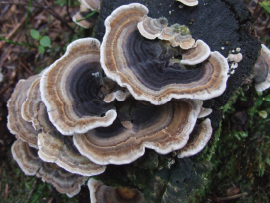
Ting Bao, MD, DABMA, MS

Jyothirmai Gubili, MS
The ASCO Post’s Integrative Oncology series is intended to facilitate the availability of evidence-based information on integrative and complementary therapies sometimes used by patients with cancer. Ting Bao, MD, DABMA, MS, and Jyothirmai Gubili, MS, present information on the potential anticancer effects of the mushroom Coriolus versicolor and suggest further studies are needed in different populations to confirm the survival benefits seen in some patients with gastrointestinal malignancies when it was given in combination with chemotherapy.
GUEST EDITOR

Jun J. Mao, MD, MSCE
Integrative Oncology is guest edited by Jun J. Mao, MD, MSCE, Laurance S. Rockefeller Chair in Integrative Medicine and Chief, Integrative Medicine Service, Memorial Sloan Kettering Cancer Center, New York.
Scientific Name: Coriolus versicolor
Common Names: Trametes versicolor, PSK, PSP, VPS, Turkey Tail, Yun Zhi, Kawaratake, Krestin

Photo by Jerzy Opioła, own work, CC BY-SA 3.0; https://commons.wikimedia.org/w/index.php?curid=25175312
Overview
A mushroom found all around the world, Coriolus versicolor is not consumed as food but employed as medicine in traditional Asian medical systems. Polysaccharide K and polysaccharide peptide, products derived from Coriolus, are thought to be responsible for its immunomodulatory and anticancer effects. Polysaccharide K is commonly used to complement standard cancer treatments in Asian countries. Another extract derived from the mushroom, versicolor polysaccharide, is also being investigated for its potential anticancer effects.
Coriolus is marketed in the form of capsules, extracts, or teas. Polysaccharide peptide and versicolor polysaccharide are sold as dietary supplements in the United States.
The Science
The majority of clinical investigations on Coriolus have been conducted using proprietary products of polysaccharide K from Japan and polysaccharide peptide from China. In randomized studies involving patients with gastric cancer who underwent curative gastrectomy, the addition of polysaccharide K to adjuvant chemotherapy with mitomycin and fluorouracil (5-FU) was shown to improve the disease-free rate (P = .047) and survival (P = .044) at 5-year follow-up, compared with the chemotherapy-alone group.1 Similar findings were reported with a combination of mitomycin, tegafur, and polysaccharide K, which significantly increased the 5-year survival over the standard chemotherapy treatment.2
In trials of patients with colorectal cancer, 2-year adjuvant treatment with oral polysaccharide K combined with tegafur/uracil was reported to reduce recurrence by 43.6% in patients with stage II disease as well as to increase survival in patients with stage III disease (74.6% in the polysaccharide K group vs 46.4% in the tegafur/uracil group) at 5-year follow-up.3 In patients after curative surgery, statistically significant improvements were observed in both disease-free (P = .013) and overall survival (P = .013) rates in the polysaccharide K/mitomycin/5-FU group compared with the mitomycin/5-FU controls.4 Polysaccharide K alone also led to significant improvements in disease-free survival compared with placebo.5
Furthermore, in patients with esophageal squamous cell carcinoma who were randomized to receive radiotherapy with or without polysaccharide K, or radiotherapy plus chemotherapy with or without polysaccharide K, the 5-year survival rates of patients in the radiotherapy/chemotherapy/polysaccharide K group were higher, although not statistically significant, compared with those in the controls.6
Polysaccharide K has also been researched for its beneficial effects. In a randomized study involving patients with advanced non–small cell lung cancer (NSCLC), treatment with polysaccharide K over 28 days resulted in significant increases in immunoglobulin G (IgG), immunoglobulin M (IgM), and leukocyte and neutrophil counts (P < .05) compared with placebo. Although there were no improvements in NSCLC-related symptoms, fewer patients who received polysaccharide K withdrew from the study because of disease progression than did control patients.7
Investigations of the use of Coriolus extracts by themselves or in formulas with other botanicals revealed positive immunomodulatory effects.8,9 However, trials in patients with breast cancer,10 hepatocellular carcinoma,11 or leukemia12 yielded mixed data.
Additional studies indicate that versicolor polysaccharide, a hot water extract of Coriolus, augmented the development of intestinal tumors in a murine model.13 Further research is needed to determine the value of such extracts as anticancer agents.
OF NOTE
Physicians should know that Coriolus extracts are used in supplemental forms by many patients with cancer. Although beneficial effects have been attributed to these products in a few studies, definitive data have yet to be determined. Also, comparative studies of the clinical effects of polysaccharide K, polysaccharide peptide, or raw Coriolus extracts have not been conducted.
Mechanistic studies conducted thus far have shown that polysaccharide peptide and another Coriolus extract selectively induce apoptosis in human promyelocytic leukemia cells (HL-60).14,15 Polysaccharide peptide also increased apoptotic cell death in camptothecin-treated cells by reducing cellular proliferation, inhibiting cell progression, reducing 3H-thymidine uptake, and prolonging DNA synthesis time.16 In another study, the peptide inhibited the interaction between HIV-1 gp120 and CD4 receptor, HIV-1 transcriptase activity, and glycohydrolase enzyme activity associated with viral glycosylation.17 In murine models, peritoneal macrophages isolated from mice that were fed polysaccharide peptide showed increased production of reactive nitrogen intermediates, superoxide anions, and tumor necrosis factor.18 Finally, polysaccharide peptide has also demonstrated analgesic effects.19
A medicinal mushroom blend (that included Coriolus) was shown to inhibit cell proliferation and to induce cell-cycle arrest at the G2/M phase in breast cancer MDA-MB-231 cells.20 The inhibition of metastatic behavior was linked to the suppression of urokinase plasminogen activator.20 Also, synergism between polysaccharide K and biologic therapies, including a concanavalin A–bound L1210 vaccine and the IgG2a monoclonal antibody against human colon cancer cells, has been reported.21
Preliminary clinical findings show consumption of polysaccharide peptide to be associated with increased leukocyte and neutrophil counts as well as increased serum IgG and IgM in patients with NSCLC.6 TNF-alpha and interleukin 8 gene expression were also induced after administering polysaccharide K to healthy volunteers and patients with gastric cancer, although individual response differed.22 In addition, polysaccharide K induced apoptosis in promyelomonocytic leukemia HL-60 cells without inducing differentiation, with p38 mitogen-activated protein kinase playing an important role in the process.23
Adverse Reactions
Coriolus is generally well tolerated, but a few adverse reactions have been reported when it was used in conjunction with chemotherapy. They include passage of dark-colored stools (not originating from occult blood),24 darkening of fingernails,25 and low-grade hematologic and gastrointestinal toxicities.3
Herb-Drug Interactions
No known interactions between Coriolus and prescription medications have been reported.
Summary
Coriolus is generally considered to be a safe dietary supplement, with its different extracts being shown to prolong survival in gastrointestinal malignancies, in combination with chemotherapy, when compared with chemotherapy alone. They also prolonged disease-free survival compared with no additional treatment after surgery in a number of Japanese studies. No known herb-drug interactions have been reported. Further studies are needed in different cancer populations to determine whether such a survival benefit persists. ■
DISCLOSURE: Dr. Bao and Ms. Gubil reported no conflicts of interest.
Dr. Bao is Director, Integrative Breast Oncology, Memorial Sloan Kettering Cancer Center, New York. Ms. Gubili is Editor, Integrative Medicine, Memorial Sloan Kettering Cancer Center, New York.
REFERENCES
1. Nakazato H, Koike A, Saji S, et al: Efficacy of immunochemotherapy as adjuvant treatment after curative resection of gastric cancer. Study Group of Immunochemotherapy with PSK for Gastric Cancer. Lancet 343:1122-1126, 1994.
2. Niimoto M, Hattori T, Tamada R, et al: Postoperative adjuvant immunochemotherapy with mitomycin C, futraful and PSK for gastric cancer: An analysis of data on 579 patients followed for 5 years. Jpn J Surg 18:681-686, 1988.
3. Ohwada S, Ikeya T, Yokomori T, et al: Adjuvant immunochemotherapy with oral Tegafur/Uracil plus PSK in patients with stage II or III colorectal cancer: A randomised controlled study. Br J Cancer 90:1003-1010, 2004.
4. Mitomi T, Tsuchiya S, Iijima N, et al: Randomized, controlled study on adjuvant immunochemotherapy with PSK in curatively resected colorectal cancer. The Cooperative Study Group of Surgical Adjuvant Immunochemotherapy for Cancer of Colon and Rectum (Kanagawa). Dis Colon Rectum 35:123-130, 1992.
5. Torisu M, Hayashi Y, Ishimitsu T, et al: Significant prolongation of disease-free period gained by oral polysaccharide K (PSK) administration after curative surgical operation of colorectal cancer. Cancer Immunol Immunother 31:261-268, 1990.
6. Tsang KW, Lam CL, Yan C, et al: Coriolus versicolor polysaccharide peptide slows progression of advanced non-small cell lung cancer. Respir Med 97:618-624, 2003.
7. Ogoshi K, Satou H, Isono K, et al: Immunotherapy for esophageal cancer: A randomized trial in combination with radiotherapy and radiochemotherapy. Cooperative Study Group for Esophageal Cancer in Japan. Am J Clin Oncol 18:216-222, 1995.
8. Wong CK, Tse PS, Wong EL, et al: Immunomodulatory effects of yun zhi and danshen capsules in health subjects—A randomized, double-blind, placebo-controlled, crossover study. Int Immunopharmacol 4:201-211, 2004.
9. Wong CK, Bao YX, Wong EL, et al: Immunomodulatory activities of Yunzhi and Danshen in post-treatment breast cancer patients. Am J Chin Med 33:381-395, 2005.
10. Iino Y, Yokoe T, Maemura M, et al: Immunochemotherapies versus chemotherapy as adjuvant treatment after curative resection of operable breast cancer. Anticancer Res 15:2907-2911, 1995.
11. Suto T, Fukuda S, Moriya N, et al: Clinical study of biological response modifiers as maintenance therapy for hepatocellular carcinoma. Cancer Chemother Pharmacol 33(suppl):S145-S148, 1994.
12. Ohno R, Yamada K, Masaoka T, et al: A randomized trial of chemoimmunotherapy of acute nonlymphocytic leukemia in adults using a protein-bound polysaccharide preparation. Cancer Immunol Immunother 18:149-154, 1984.
13. Toth B, Coles M, Lynch J: Effects of VPS extract of Coriolus versicolor on cancer of the large intestine using a serial sacrifice technique. In Vivo 20:341-346, 2006.
14. Yang X, Sit WH, Chan DK, et al: The cell death process of the anticancer agent polysaccharide-peptide (PSP) in human promyelocytic leukemic HL-60 cells. Oncol Rep 13:1201-1210, 2005.
15. Lau CB, Ho CY, Kim CF, et al: Cytotoxic activities of Coriolus versicolor (Yunzhi) extract on human leukemia and lymphoma cells by induction of apoptosis. Life Sci 75:797-808, 2004.
16. Wan JM, Sit WH, Yang X, et al: Polysaccharopeptides derived from Coriolus versicolor potentiate the S-phase specific cytotoxicity of Camptothecin (CPT) on human leukemia HL-60 cells. Chin Med 5:16, 2010.
17. Collins RA, Ng TB: Polysaccharopeptide from Coriolus versicolor has potential for use against human immunodeficiency virus type 1 infection. Life Sci 60:PL83-PL387, 1997.
18. Liu WK, Ng TB, Sze SF, et al: Activation of peritoneal macrophages by polysaccharopeptide from the mushroom, Coriolus versicolor. Immunopharmacology 26:139-146, 1993.
19. Ng TB, Chan WY: Polysaccharopeptide from the mushroom Coriolus versicolor possesses analgesic activity but does not produce adverse effects on female reproductive or embryonic development in mice. Gen Pharmacol 29:269-273, 1997.
20. Jiang J, Sliva D: Novel medicinal mushroom blend suppresses growth and invasiveness of human breast cancer cells. Int J Oncol 37:1529-1536, 2010.
21. Tsukagoshi S, Hashimoto Y, Fujii G, et al: Krestin (PSK). Cancer Treat Rev 11:131-155, 1984.
22. Kato M, Hirose K, Hakozaki, M, et al: Induction of gene expression for immunomodulating cytokines in peripheral blood mononuclear cells in response to orally administered PSK, an immunomodulating protein-bound polysaccharide. Cancer Immunol Immunother 40:152-156, 1995.
23. Hirahara N, Edamatsu T, Fujieda A, et al: Protein-bound polysaccharide-K (PSK) induces apoptosis via p38 mitogen-activated protein kinase pathway in promyelomonocytic leukemia HL-60 cells. Anticancer Res 32:2631-2637, 2012.
24. Shiu WCT, Leung TWT, Tao M: A clinical study of PSP on peripheral blood counts during chemotherapy. Phytotherapy Res 4:217-218, 1992.
25. Kidd PM: The use of mushroom glucans and proteoglycans in cancer treatment. Altern Med Rev 5:4-27, 2000.

